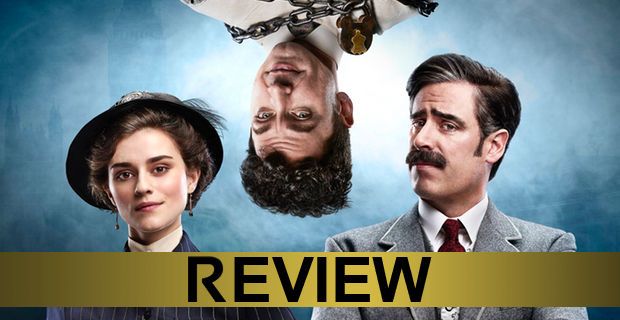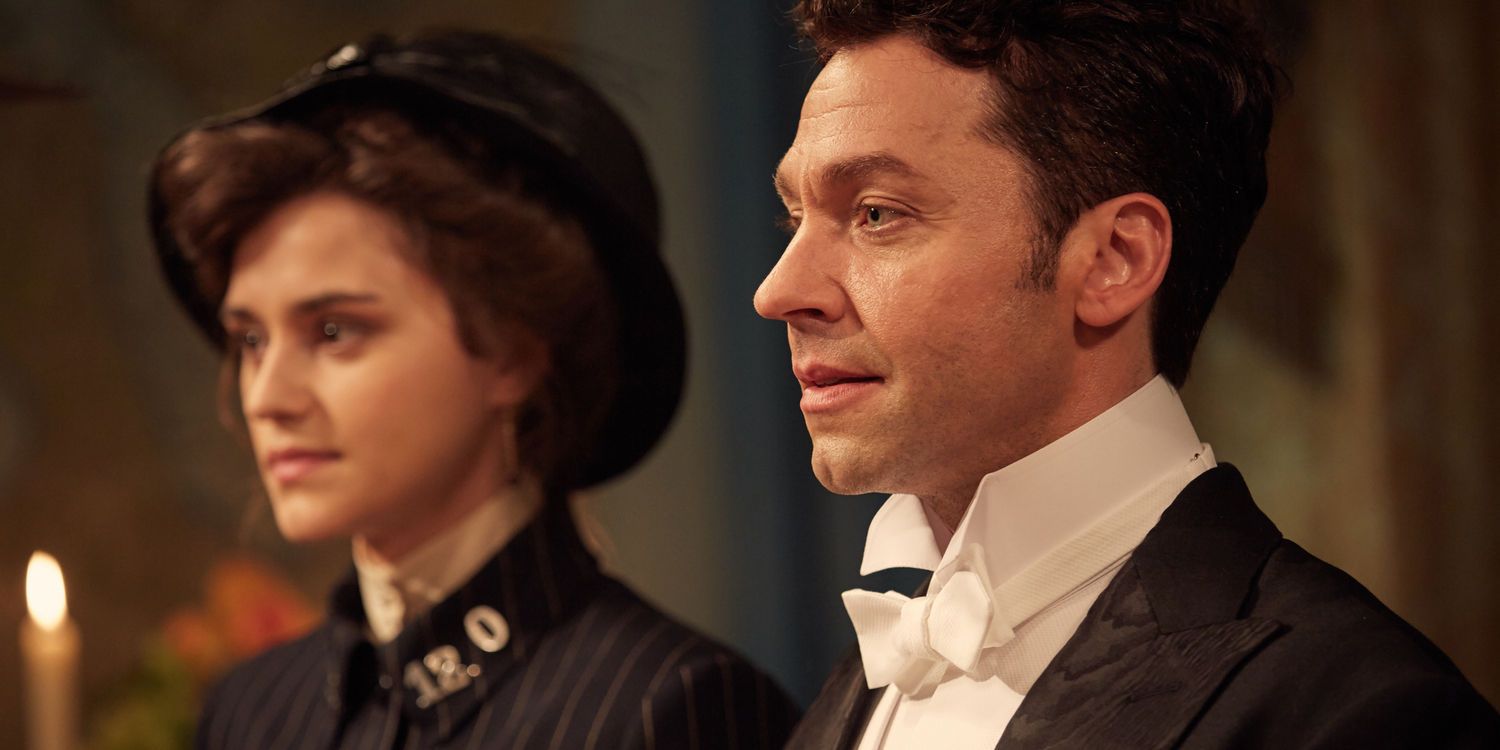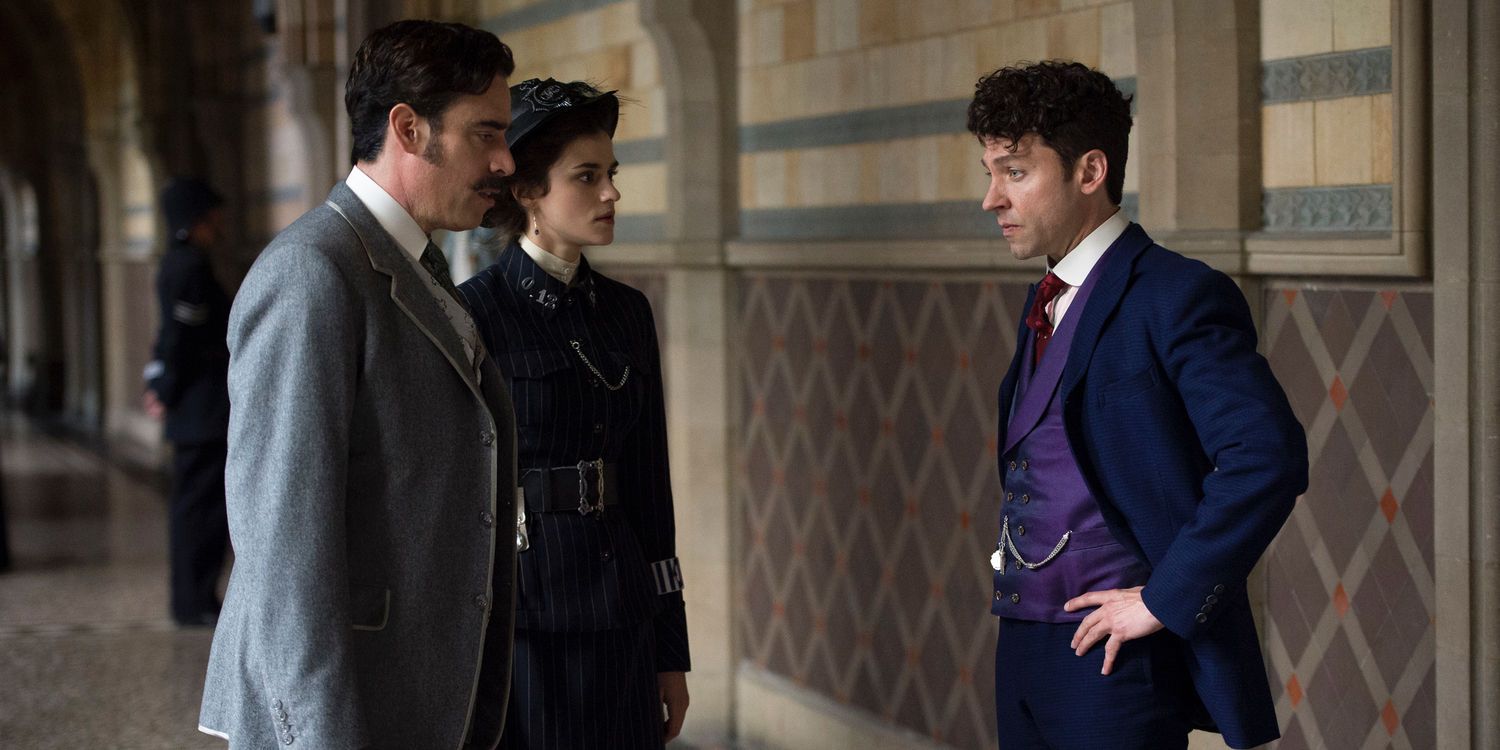[This is a review of the Houdini & Doyle series premiere. There will be SPOILERS.]
-
Houdini & Doyle, FOX's new police procedural (yes, the series has already begun airing outside the US) is an odd series, and not entirely because it pairs fictionalized versions of Harry Houdini and Sir Arthur Conan Doyle as a crime-solving duo in early twentieth century London. Sure, that is a far cry from CSI or NCIS or any number of relatively grounded procedural dramas, but what's interesting is how the show blurs the lines between reality and fiction, not only utilizing two individuals who are undoubtedly famous in their own right, playing off their public personas and the public fallout between the two, but also because one of them happens to be the creator of arguably the most famous fictional detective of all time. You might think that the author of Sherlock Holmes solving crimes in a weekly procedural would strain the credulity of a subgenre that has at times threatened to descend into self-parody (I'm looking at you Law & Order: SVU), but Houdini & Doyle seemingly wants to cut doubters off at the pass, offering a weirdly self-aware take on its titular characters and, for better or worse, Doyle's role in popularizing detective fiction amongst the masses.
That doesn't mean the series veers into meta-television necessarily; it's still a procedural through and through. In the pilot, the show exists somewhere between eagerly pointing out the historical plausibility of it all and vehemently denying it's basically Castle with a legendary escapologist on hand to liven things up. To be fair, maintaining itself as any of the above would involve a considerable undertaking from week to week, so after establishing its premice and its titular characters quite quickly, Houdini & Doyle essentially resigns itself to being a standard piece of entertaining whodunit – albeit with the rather unique hook.
The fascinating lure of the series begins with the soot-stained streets of Victorian London and continues into the squabbling dynamic of the two leads. Stephen Mangan (Episodes) plays Doyle as a sympathetic believer in the supernatural, while Michael Weston (Elementary) delivers a cocky and brash Houdini eager to expose charlatans who prey on the emotions of those seeking answers to mysteries beyond the realm of logic. The dynamic of skeptic and believer is more than a little reminiscent of Scully and Mulder's professional relationship, and the fact that these were positions both men took in real life makes you wonder how this series didn't exist before now. It's a perfect pairing of opposing ideologies and temperaments that create a source of renewable conflict for the series to revisit time and again as the would-be detectives investigate case after case.
In the premiere, 'The Maggie's Redress,' it's clear Houdini & Doyle is still fiddling with just how much conflict it wants to see come as a result of each man's opposing beliefs. At times, the show threatens to paint Doyle as the butt of the joke, a serious man who has made the silly mistake of putting his faith in mediums and the hope that a supernatural answer may explain the otherwise earthbound mystery he has tasked himself with investigating. For the most part, though, Doyle's hopes come off as sympathetic and understandable, especially when a medium's obvious chicanery is undone after she mistakenly supposes his wife to be dead, not merely in a coma. Weston, on the other hand, excels at presenting Houdini as a kind of constant showman, someone who is always "on". He struts through each scene as though he'll be compelled to wrap himself in irons and dangle upside down in a tank full of water at any given moment. This exuberant, arrogant personality is engaging when facing opposition from Doyle or any number of witnesses and suspects as the crime of the week takes shape over the course of the hour. When the time comes to imbue the illusionist with the same humility as his counterpart, however, the series struggles to give a man who could make elephants disappear the ability to conjure up anything more than a guise as an extraordinary showman.
Hopes that Weston and the series will find more layers to Houdini over the course of its 10-episode run encounter a charming problem with the introduction of Constable Adelaide Stratton (Rebecca Liddiard), who brings a different perspective to the table that alters things considerably, as Stratton's primary conflict is with gender roles in early twentieth century London society itself. Late in the premiere, Stratton is accused of carrying on an affair with Houdini, because her boss can't accept a woman in her position, let alone one who is as competent and driven as she. Such contemporary additions tend to shatter the illusion of period pieces, suggesting a feeling of superiority over the past.
There's less concern of that happening here as Houdini & Doyle establishes its setting early on as mostly a hook, allowing the series freedom to incorporate sensibilities that would be more familiar and frequent today. And yet, the addition of Stratton complicates things in a peculiar way, as she seems to split the difference between Houdini & Doyle's opposing viewpoints, but suffers from a lack of attention that might otherwise make the character an appealing alternative to either extreme. There is also cause for concern that Stratton, who puts up a compelling argument of why she would even want to be a constable, will become a romantic amusement for the show as a means of offering Houdini an avenue from which his off-stage persona can be explored. The fear, then, is this will push the lone female protagonist into even more of a tertiary position than she already is.
After the premiere, Houdini & Doyle still reads like an odd mishmash of fictionalized real-world characters and heightened procedural storytelling. The series is characterized by the unique appeal of the men for whom it is named, but after the first hour the show still wants for definition beyond its title. In particular, the first hour often seems uncertain the tone it wants to set –vacillating between being a lighthearted romp and a serious crime drama. Clearly that's a tough balance to strike, but that's not to say it won't find it; many shows have kinks to work out over their first few episodes. With any luck, Houdini & Doyle will find the right formula before too long.
-
Houdini & Doyle continues next Monday with 'A Dish of Adharma' @9pm on FOX.
Photos: Robert Vigliasky/ FOX



